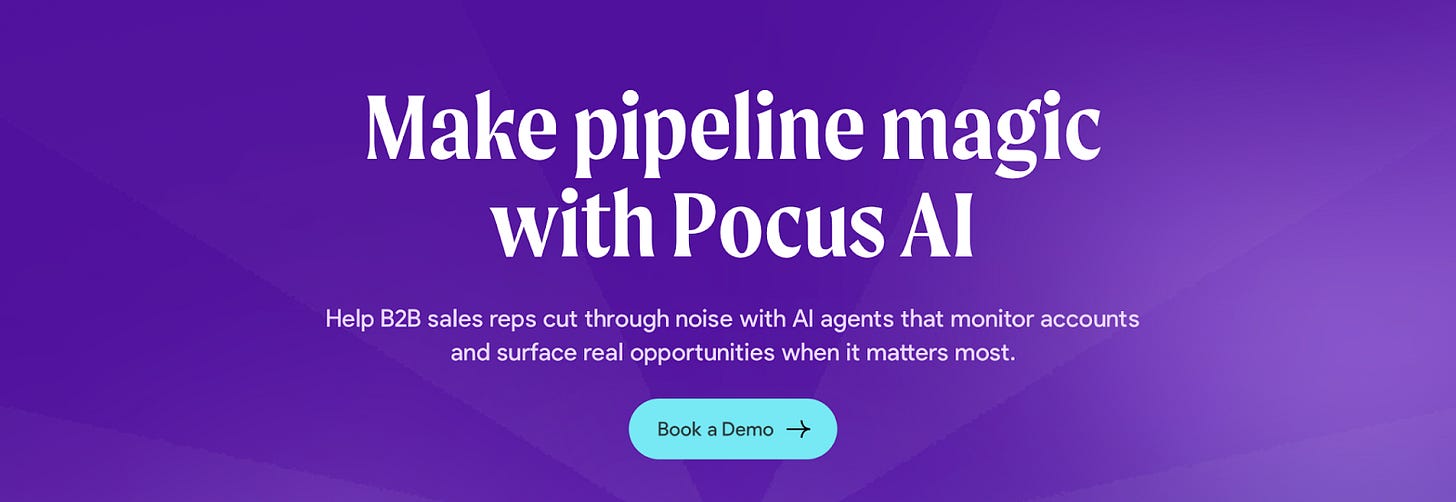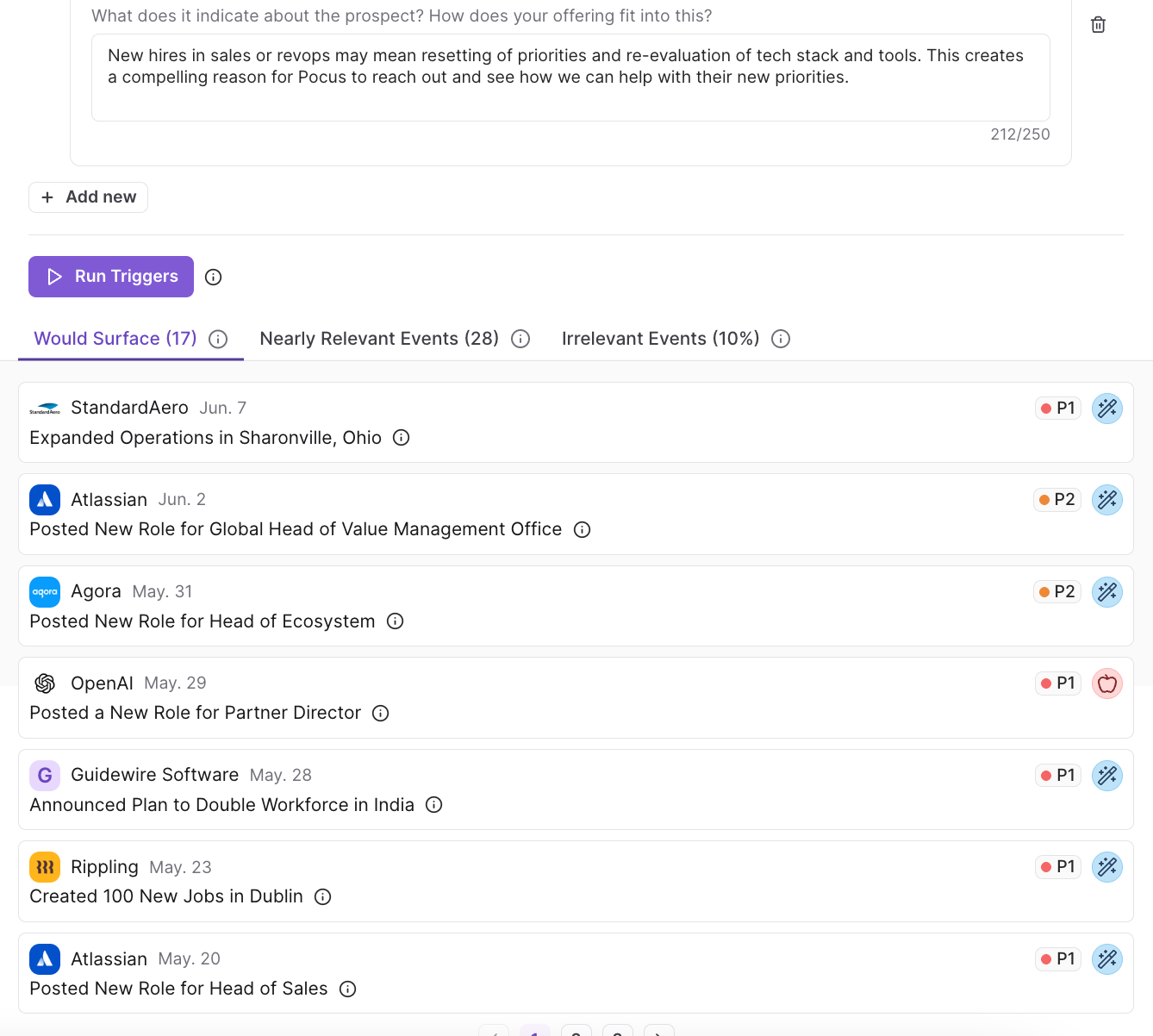The Company Building the "Relevance Agent" for AI Sales Intelligence 🔮
Pocus x The Signal
If you were forwarded this newsletter, join 4,171 weekly readers—some of the smartest GTM founders and operators—by subscribing here:
Hey y’all! 👋
I have watched Pocus very closely for many years now (in fact, maybe closer than any other company).
I competed with Pocus when I was building my last company, Groundswell. During that time, I followed their Head of Marketing, Sandy’s, LinkedIn posts and would find myself nodding along throughout a post, agreeing with everything she said. Then, finish the post, and think, “wait, they’re my competitor, I need to reach out to every person and company that has engaged with this post because anyone that agrees with this will definitely agree with how I think about the world too.” Then, later that day, I would come across a clip of Alexa (Co-Founder & CEO) interviewing a CRO or VP of RevOps at some hot SaaS company. Again, I'd find myself watching voraciously, only to finish the clip and think, 'this is my competition—how do I create content and community that's this compelling?!' Even as a direct competitor, and then slowly a frenemy, and now a friend, I've always admired the way Alexa and the team at Pocus have thought about the world of modern go-to-market.
I've observed them building in the product-led sales space very thoughtfully. Then, last year, expanding to other signals beyond product usage. And now, most recently, thinking deeply about how AI intersects with GTM.
They're taking an approach that I have slowly built conviction around: holding two things true at the same time: 1) The 10x GTM rep is real, and 2) We shouldn't just automate away everything in GTM with AI.
Leveraging AI should be done thoughtfully, and Pocus is building this future today.
That's why I'm excited to give you direct access and a behind-the-scenes look at what they're building in today's sponsored deep dive on Pocus.
Here's what we cover in today's post:
What happens when data and signals become commoditized
The "relevance agent" and why it matters
Building a flexible but opinionated product in the AI era
How Pocus differentiates in a sea of competition
The future of “AI Sales Intelligence”
The importance of educating the market during this crazy moment in time
Alright, let’s get into it.
The Company Building the "Relevance Agent" for AI Sales Intelligence 🔮
Pocus has been building in the product-led sales space since day one, and what started as a platform to unlock product usage data for sellers has evolved into something much bigger—what they call "AI sales intelligence."
I think this is the future. If I squint, what I see is something that resembles what I have called a “System of Intelligence.” AI accelerates the need and opportunity for this product to exist in the market.
The Commoditization Problem
"I actually think data and signals just become a commodity." Alexa said this to me when we caught up recently, after I (timidly) suggested the idea that, I believe, in ~18 months, there will be a number of companies who have figured out how to capture the vast majority of signals, at a high degree of accuracy (and low cost).
For example, showing an Okta rep a signal that a security breach happened at one of their target accounts + a mention of solving it in the prospect’s latest quarterly earnings call + surfacing the Okta product that solves this type of breach = relevance (powered by signals).
If/when signals become commoditized, the real question isn't who gets to signals first—it's what happens when everyone has them.
"More is not better," Alexa emphasized to me. "You need relevant data at the right time with relevant context." The first thing AI did was volume. But, more data ≠ better.
More tools is another problem with modern selling. Tool sprawl and complexity of orchestrating intelligent workflows leads to siloed data, tool fatigue and missed opportunities. This lack of a cohesive strategy/intelligence overwhelms reps (and RevOps) and means they don’t know how/where to action the data for target accounts.
This gets at something I've been thinking about a lot over the last year. If signals become as commoditized as email addresses are today, and tools sprawl increases, then where will value accrue in pipe gen?
Pocus’ answer lies in what they call their "relevance agent."
The “Relevance Agent”
Think of the relevance agent as a reasoning engine that can make decisions, think, learn, and become as smart as your average sales rep. Sounds pretty magical, right?
But here's where it gets interesting—it's not just learning generic sales tactics. It's being trained on both your specific business and your prospects' businesses.
So, when Pocus’ product gets trained on Canva’s business—one of their customers—as well as Canva’s prospects and customers, it begins to learn their pain and how Canva’s value prop can solve that pain. It’s specific to the company. And, the more it is used, the smarter it gets over time.
This is fundamentally different from the "throw a phone book at a rep and assume they know what to do with it" approach that characterizes most sales intelligence tools today. Instead, as Alexa puts it: "With Pocus, it's AI telling the rep the starting point."
I personally believe that relevance > personalization. In fact, I would go as far as to say that reaching out to the relevant company/person with a relevant message (based on intent or proxy that they have a pain your product solves) is 10x more important than any email copy you could send them. And the smartest reps are replacing personalization with value-selling. And using a “reasoning engine” (AI) to help them do this.
Three Pillars of Differentiation
Pocus is building three core differentiators that all stem from their relevance agent.
They believe “the future of sales isn't about using more tools—it's about consolidation, intelligence, and prescriptive guidance.”
1. Consolidation
A unified platform that brings together data, workflows, and insights across GTM. Not siloed point solutions with tab overload and tool sprawl.
This isn't about giving reps more tools to figure things out—it's about the system actively guiding them toward the highest-value activities.
One example where this manifests in Pocus is through their recent launch of SmartMaps—an AI-powered org chart for smarter multi-threading/selling into large orgs—that’s built right into their product.
2. Intelligence
AI that deeply understands your business from internal and external data, surfacing relevant insights customized to your strategy and motion. Not data overload, with generic insights.
More relevant data, less noise. This is what I’ve been talking about for a while. More volume is not usually a good thing. Instead, the holy grail product will surface the relevant signal(s) necessary. No more, no less.
Pocus is not designed to surface every possible data point. It curates and contextualizes, showing reps exactly what matters for each specific account. And equally important, not showing certain events that are not relevant (see below).
3. Prescriptive guidance
Guidance, not guesswork. Pocus is building an AI that “nudges reps on the shoulder” with clear priorities: which accounts to work, what plays to run, and who to engage. Not a firehose of signals with no direction.
And the product learns over time. You can also train and customize it, ensuring every insight is relevant, not just a siloed system with scattered signals.
The Philosophy: Flexible but Opinionated
One of my favorite aspects of Pocus's product philosophy is what Alexa describes as "flexible but opinionated."
"Everything in Pocus is flexible—the emails you write, the kind of playbook signals you surface, the prompts you see, everything's flexible, but we start with an opinion. We start an out-of-box playbooks you should run. [And then you can customize it from there].”
This approach matches the nuanced buyer journey of 2025 with a nuanced selling process. Every business is unique, but also, most teams don't want to start from a blank slate. They want intelligent defaults that they can then customize as they see fit.
For example, when you input an email template, Pocus will automatically deconstruct it and recommend how it should work across other emails. I would call this “productizing best practices” (of which Alexa, and the team at Pocus definitely have at this point).
AI Sales Intelligence as a Category
Pocus is building in the category of "AI sales intelligence.” But this isn't about building bulk CRM enrichment or automation, it's about taking on the rep interface.
The platform includes use cases like:
Signals of intent and play execution
Waterfall email enrichment (the commoditized piece)
Research and list building (launched today!)
Message generation
Pipeline reporting
Lead scoring
"I think it's really important for it to be consolidated and not different point solutions because the whole system has to work together and learn from each other," Alexa told me.
This is classic compound startup approach—like Rippling's approach to HR—where the integrated platform unlocks capabilities that silo’d point solutions would otherwise not be able to deliver.
The Market Education Challenge
One of the biggest hurdles Pocus faces isn't technical—it's educational.
The challenge is that while a few reps on every team use ChatGPT well, 80% don't, and even the power users aren't leveraging AI at the level that a purpose-built workflow application can enable.
This is where I think Pocus has a significant opportunity. Rather than just educating people about their specific product, they are positioning themselves as the leader in helping sales teams understand how to be more AI-native in general. I saw them build a world-class content engine + community around educating the market on product-led sales back in 2020-2022. And now, they’re running this same playbook around building a community for 10x GTM reps and leaders.
Looking Forward
What excites me most about Pocus isn't just the technology—it's the philosophy. In a market obsessed with more data and more volume, they're betting on relevance. And in an industry where most tools get worse over time, they're building something that gets smarter with more use.
Thoughtful, AI-driven approaches to GTM are the ones that will win. And this is the path Alexa and Pocus are blazing. I’m pumped to continue to watch as they build in this space and help continue to modernize go-to-market for years to come.
If you're interested in exploring how AI sales intelligence could work for your team, reach out to learn more about Pocus and their approach to relevance-driven sales.
Thank you for your continued attention and trust—I do not take it for granted.
See you next time,
Brendan 🫡




